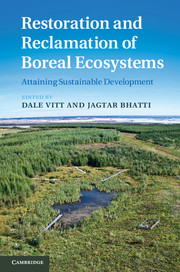Book contents
- Restoration and Reclamation of Boreal Ecosystems
- Restoration and Reclamation of Boreal Ecosystems
- Copyright page
- Contents
- Contributors
- Preface
- Part I Utilizing natural regimes as models for reclamation and restoration
- 1 The changing boreal forest
- 2 Disturbance and the peatland carbon sink in the Oil Sands Administrative Area
- 3 Regional-scale modeling of greenhouse gas fluxes
- 4 Reclamation and restoration of boreal ecosystems: attaining sustainable development
- 5 Fundamental paradigms, foundation species selection, and early plant responses to peatland initiation on mineral soils
- Part II The challenges of reclamation in boreal ecosystems
- Part III Carbon in the boreal forest
- Index
1 - The changing boreal forest
Incorporating ecological theory into restoration planning
from Part I - Utilizing natural regimes as models for reclamation and restoration
Published online by Cambridge University Press: 05 October 2012
- Restoration and Reclamation of Boreal Ecosystems
- Restoration and Reclamation of Boreal Ecosystems
- Copyright page
- Contents
- Contributors
- Preface
- Part I Utilizing natural regimes as models for reclamation and restoration
- 1 The changing boreal forest
- 2 Disturbance and the peatland carbon sink in the Oil Sands Administrative Area
- 3 Regional-scale modeling of greenhouse gas fluxes
- 4 Reclamation and restoration of boreal ecosystems: attaining sustainable development
- 5 Fundamental paradigms, foundation species selection, and early plant responses to peatland initiation on mineral soils
- Part II The challenges of reclamation in boreal ecosystems
- Part III Carbon in the boreal forest
- Index
- Type
- Chapter
- Information
- Restoration and Reclamation of Boreal EcosystemsAttaining Sustainable DevelopmentPublisher: Cambridge University PressPrint publication year: 2012
- 2
- Cited by

